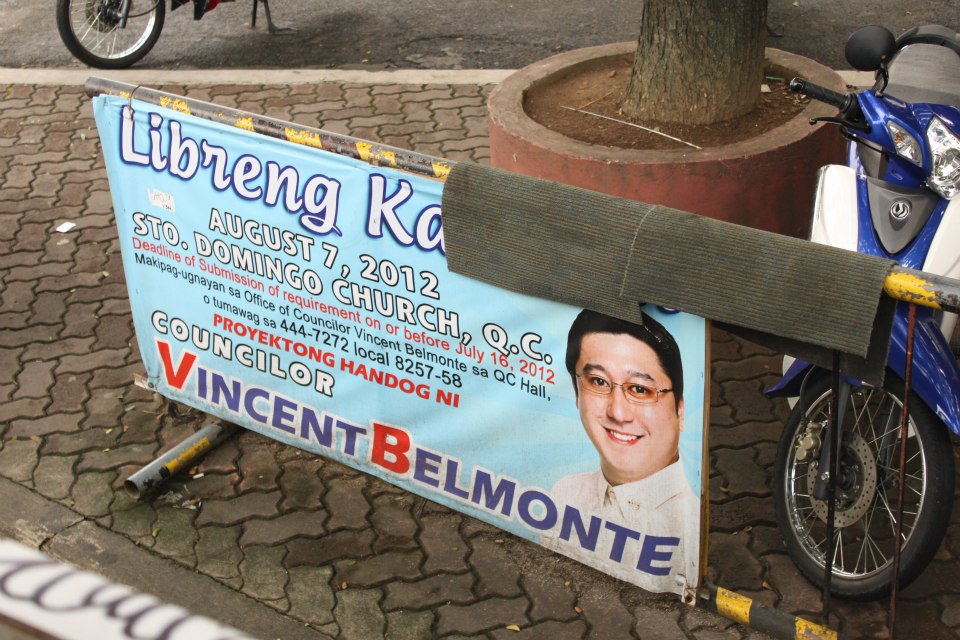By PHILIP PARAAN
Photos courtesy of ANTI-EPAL/DAKILA ARTIST COLLECTIVE
CITY tours are usually organized to educate tourists and the general public on cultural and historical landmarks and other interesting places. But this time, a different guided tour takes on patronage politics as its agenda and object of discovery.
Anti-epal is an ongoing shame campaign on Facebook against the practice of politicians using government projects to promote themselves. The crusade that has been sweeping cyberspace is now being taken to the streets — after its initial tour of Paranaque, the group moved to Quezon City (QC).
Their aim is to put a stop to the habit of politicians of putting blaring names and photographs in ubiquitous political ads, signages, and other posters of government projects and programs.
“Epal” is Pinoy slang referring to people who likes to hog the limelight, get noticed or, plainly opportunists who like to get credit for everything. Through Anti-epal, netizens have put this slang to a more political use, pointing to the various shameless promotions, self-serving gimmicks and ploys used by politicos.
Carlos Celdran, a social critic and cultural tour guide, has joined forces with satirist Juana Change, the Dakila Artist Collective and members of the online group Anti –Epal to spot these signages and tell the public that this kind of practice is unacceptable.
“QC is perhaps the epal capital of the country,” Celdran quips, referring to the historical fact it was one of the oldest cities named after a living president.
Atop an open truck, the tour scoured certain parts of QC recently in search of political banners and markers. Because of their ubiquity, it proved to be an easy task. The group counted, measured and identified the different kinds of epal gimmickry they saw.
With his brand of wit, Celdran poked at these and noted the garden variety included: the hereditary epal, the kind that extends between political families; the insidious epal, the latent but not so subtle ones, and the acronym epal, which plays on subliminal connection.
The group encouraged members of the online community to share terms and references to an epal dictionary to keep the discourse and awareness campaign going.
They gave awards to the politician with the most number of epal posters spotted. For QC, Councilor Vincent Belmonte of the 4th District got the shame award.
“Being in office is not a privilege, politicians should serve anonymously,” Celdran asserted.
The group reiterated however that they were not targeting specific politicians. It is the practice they do not approve.
President Aquino declared earlier in his term a policy to ban this practice, which was translated into a memo released in September 2010 by the late Local Government Secretary Jesse Robredo.
The memo prohibits the practice of putting up billboards, signages and other information bearing the names, initials or pictures of government personalities on all government projects and government properties.
Despite this lead from the national government, bad habits are really hard to break. It has remained the order of the day for most politicians. During the Habagat calamity, one photo that surfaced online and got so much flak was that showing canned goods, re-labeled with pictures of the local leaders of the Municipality of Placer in Masbate.
Ariel Cardaño, who has been living in Quezon City all his life, said he abhors politicians who excessively flaunt their names on every project, which are actually funded by their constituents.
“It’s a shame that these politicians have more tarpaulins than real projects,” Cardaño said.
Another local remarked that this propaganda was just fine with him, but that he hopes leaders would refrain from doing it in the meantime since it is still far from the 2013 elections.
Meanwhile, a QC resident observed there seemed to be a particular group of people tasked to hang and put up tarpaulins, paint billboards and take down and replace them again. “They’re very active,” he commented.
Organizers of the anti-epal tour reported that tarpaulins were promptly removed in some areas in the city, and tiles once bearing the initials HB found on the island of the Timog and Scout area in South Triangle were painted over before the group arrived. Coincidence or not, they considered these reactions as “the fruits of the anti-epal.”
Juana Change said that the project was started by Vince Lazatin of the Transparency and Accountability Network and Betty Romero of the Lifeline Foundation Support Team, Inc. The groups’ postings have become viral, prompting a wave of other concerned citizens to upload photographs of similar content.
The responses, according to Juana Change, were overwhelming. In a day alone, some people were able to organize 12 anti- epal chapters. She said they were bent on continuing the efforts and bringing the tour to other parts of the country.
